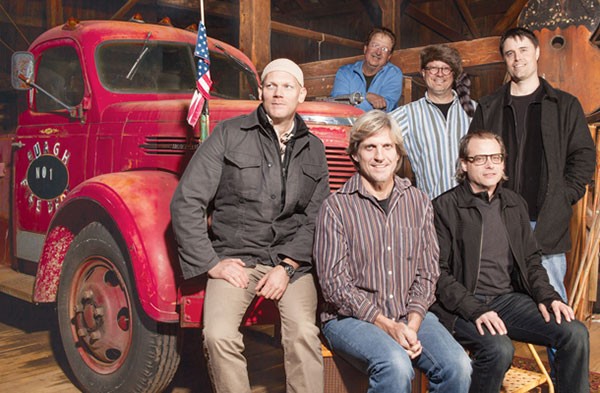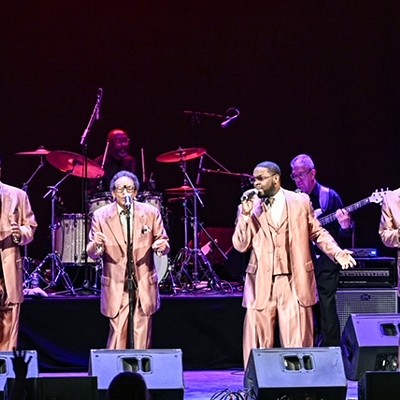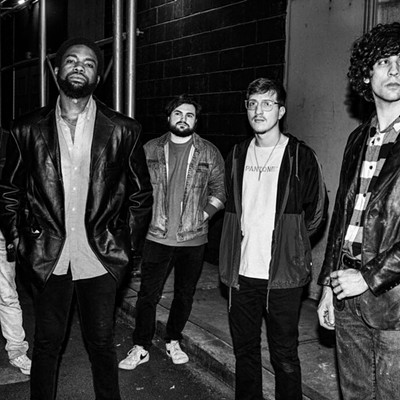
It wasn't a long, drawn-out process that led to one of the city's most popular rock bands of the '90s reuniting. Quite the opposite: The Gathering Field's new start came to frontman Bill Deasy on the spur of the moment.
"I was flipping through the channels and I saw Pearl Jam, I think — a rerun of Saturday Night Live or something, a live performance on some show," he recalls. "They were just jamming, they were just so into it, and I kind of missed — there's something about the band you come up with, it's a true democracy, it's a different dynamic. I've hired people [as a solo artist] and gotten very close to that, but it's just not the same.
"I'm sort of impulsive. Suddenly, that's what had to happen."
The Gathering Field had come up in mid-'90s Pittsburgh, a rung below Rusted Root and The Clarks on the ladder to mainstream fame. Like both of those groups, the band signed to a major label (in this case, Atlantic, in 1996), and had a couple of regional radio hits — the dreamy "Lost in America" and riff-heavy alt-rock tune "Rhapsody in Blue."
"It was magic right then — ["Lost in America"] just lit up Pittsburgh," Deasy says. "I'd hear people whistling it, who I didn't know."
But The Gathering Field never quite became a national sensation.
"That record came out, and pretty early after it came out nationally, you could see the writing on the wall," he says. "You didn't always want to read it, but basically — Matchbox 20 came out at that same time, and no one knew who they were either, but everywhere you went, you'd see Matchbox 20 displays at the record store. They were the other rock band that was coming out right then, and they got all the attention.
"In a lot of ways, Atlantic managed to stall any progress we were making. And we let it, really. We never embraced the Dave Matthews model of being your own business, which, in hindsight, we should have more."
After a lengthy denouement, the band broke up for good in 2002. Deasy went on with a solo career, releasing a half-dozen albums, getting local and national TV-placement deals and writing songs on a contract basis. (He also, in recent years, has been in charge of booking Allegheny County's concerts in the parks.)
It was last year, after more than a decade away from the band, that Deasy announced The Gathering Field would be getting back together — not just for a one-off show, as they'd done a few times, but to record new material.
"I was sort of excited about it," says drummer Ray DeFade, who had left the band even before the final breakup, and was replaced for a time by Joe Zelek. "I'd sort of gotten away from playing — this band was definitely the highlight of my career." (DeFade also plays jazz, and had been in a number of other combos around town.) Also part of the reunited lineup: Original guitarist Dave Brown and bassist Eric Riebling; organist John Burgh (who often played with the band during its primary run); and, newly added to the lineup, Clark Slater, formerly of Push.
"I didn't know this — I just put out a [solo] record a year ago, that I really love — but I feel like, in my brain or in my heart or something, I'd been stockpiling songs, unbeknownst to me," Deasy says. "Because as soon as we decided to do this, I was in this weird, clear writing place. I realized I had lost a certain part of my voice that only they can help me use."
The new album, Wild Journey, has something of a concept behind it: In fact, Deasy says, to an extent it picks up some of the themes of the old Gathering Field body of work. "The first song I wrote for the album is called ‘Not Ready Yet," Deasy explains. "It was an exercise to see what I could do with this project: I took the character from ‘Lost in America,' who was kind of a poseur. Kind of a drifter, poseur. He wasn't a super admirable character. I took him ahead 10, 12 years, and I imagined him still kind of stuck in this place of invulnerability but shallowness. There's a lot of me in that: I'm sort of stuck in this shut-off place. So I took that character and put him on the cusp of changing, shifting, then a lot of the songs sprung out of that."
But if the songwriting mojo has come rushing back, Deasy admits that the landscape has changed considerably since The Gathering Field was last a force.
"It's a little too soon to say" how the band's old fan base has held up, Deasy says. "Those reunion gigs we'd do, people seemed to still be there. A lot of those folks are like me — people who used to go to Nick's Fat City every Thursday and get drunk, they have lives now. But I'm pretty optimistic that they're still out there.
"Radio isn't the force that it once was. A couple of our songs are on WDVE and WYEP right now, but I don't know if that can be the tool that it once was for us. But I feel like there's potential for a new dynamic — and the good thing is, our lives aren't riding on it. We're not touring, playing seven nights a week in every state."













